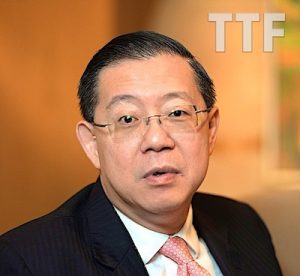
Following is an article published online complete with responses by TTF (in blue):
KUALA LUMPUR: The government’s revenue from the re-introduced Sales and Services Tax (SST) for the final quarter of this year is estimated at RM4 billion, giving a net impact of RM17 billion.
The shortfall compared to the revenue under the old Goods and Services Tax will be partly made up by the higher petroleum revenue, estimated at RM5.4 billion following the rise in Brent crude price to US$70 per barrel compared to the average assumption of US$52 for Budget 2018.
TTF: Bottom line is, there was a shortfall.
Compare this with what Guan Eng told newsmen on the 8th of March 2017.
On that day, he announced that the government could do away with the GST as it received more than RM20 billion in savings from the rationalisation of subsidies for cooking oil and sugar.
Lim also said that the savings from the reduced subsidies had offset a major reduction in revenue from Petronas owing to the drop in the price of crude oil.
However, despite there being a major increase in petroleum related revenue since then, we’re still faced with a shortfall in tax related income.
Makes sense?
In addition, the dividend from government-linked companies (GLCs) including Petronas and Khazanah Nasional Berhad is up to RM5 billion.
But this additional dividend is one-off, in line with the increase in global crude oil price, said Finance Minister in the Dewan Rakyat in reply to Datuk Seri Ismail Sabri Yaakob (BN-Bera).
Despite the higher crude oil price, Lim said that petroleum-related revenue contributed only around 3.3 per cent to gross domestic product compared to 9.2 per cent in 2009, when global crude oil was at US$62 per barrel.
“This shows the government has reduced the dependence on petroleum-related revenue,” he said.
TTF: See how he spins?
I just proved to you, that in March 2017, he seemed coxk sure we could do away with GST despite low crude oil prices.
The price per barrel has since risen by about 33%.
Yet, we’re losing out on tax related revenue due to the implementation of the SST.
How is Lim going to wriggle his way out of this?
Lim noted that other measures to increase the federal government’s revenue include continuous audits and investigations by the Inland Revenue Board and the Royal Malaysian Customs in order to raise tax compliance and reduce the tax gap.
The government will also explore new revenue sources, especially from online transactions and review of tax incentives, in order to generate economic activity and minimise the impact of the revenue reduction.
TTF: Why can’t he just come clean on Pakatan’s blunder and re-introduce the GST?
It will also implement budget rationalisation by rearranging expenditure priorities and reviewing, postponing and renegotiating high-cost projects.
TTF: But didn’t he tell us in 2017 that the government could do away with the GST as it received more than RM20 billion in savings from the rationalisation of subsidies for cooking oil and sugar?
What happened to the RM20 billion?
Additionally the government will rationalise the functions of departments, programmes and projects to avoid overlapping and to enhance governance related to public procurement. These measures are expected to reduce overall expenditure by RM10 billion.
TTF: Why not just rationalise Pakatan Harapan instead?
However, Lim pledged that the government remains committed to the Pakatan Harapan manifesto, an important part of which is to reduce the cost of living.
TTF: It’s been more than five months since the general election concluded, and yet, almost 90% of the pledges have not been fulfilled.
So why not stop the bullshxt about the need to fulfil pledges and start presenting us with viable solutions to restore the economy?
He said the stabilisation of the prices of RON95 petrol and diesel at RM2.20 and RM2.18 a litre has resulted in lower prices for Malaysians but costing the government RM3 billion in fuel subsidies as of December.
TTF: Did Pakatan not promise to peg the price of petrol at a much lower rate?
Source: The Mole



